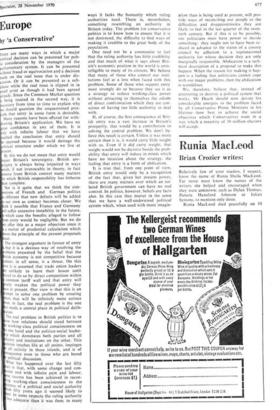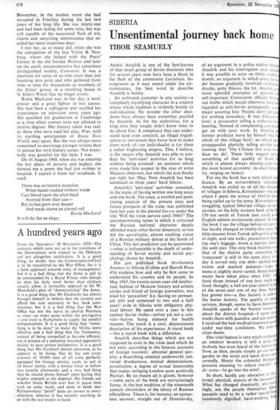Runia MacLeod
Brian Crozier writes:
Relatively few of your readers, I suspect, know the name of Runia Sheila MacLeod. Far more must know the names of the writers she helped and encouraged when they were unknown; such as Dylan Thomas, Pamela Hansford Johnson or Julian Symons, to mention only three.
Runia MacLeod died peacefully on 10
November, in the modest room she had occupied in Finchley during the last two years of her long life. She was ninety-one and had been fading for some time, but was still capable of the occasional flash of wit, charm and surprising reminiscence that re4 called her more imperious days.
I met her, as so many did, when she was the companion of the late Victor B. Neu- burg, whom she helped with the Poets' Corner in the old Sunday Referee and later on the small, unremunerative but sometimes distinguished weekly, Comment. It was a platform for some of us who were then just breaking into print and who gathered from time to time for discussions as members of the Zoists' group, in a rambling house in St John's Wood that no longer exists.
Runia MacLeod was, in her day, a mod- erniser and a great fighter in lost causes. She had been a suffragette and recalled her experiences on television some years ago. She qualified for graduation at Cambridge at a time when women were not allowed to receive degrees. Her literary talent was real, as those who have read her play, Wax, with its startling anticipation of Brave New World, may agree. But she was always more concerned to encourage younger writers than to pursue her own literary career. Not every- body was grateful for her help. I was.
On 14 August 1968, when she was entering the last phase of poverty and neglect, she showed me a poem she had just written in hospital. I copied it from her notebook. It read: There was an historic occasion, When hands washed without water Cast blood upon the alien head Averted from their cue- . But its hue grew ever deeper And made shame an eternal red.
Runia MacLeod It will do, for an elegy.















































 Previous page
Previous page